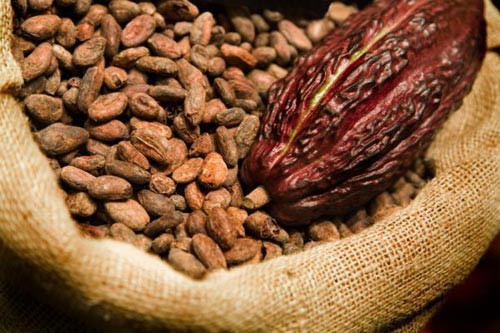Cocoa synthesis limits tumor growth
A chemical similar to the compound in cocoa beans can slow the growth rate and reduce the tumor's destructive ability through laboratory tests.
Researchers at Georgetown University Medical Center say that this substance should be tested further as a means of chemical prevention or even a new treatment for cancer.
The study's lead author, Dr. Min Kim, a researcher from the Department of Oncology, Lombardi Mixed Cancer Center, said: 'We all know eating chocolate very well. This study provides a reason why this is true '.
In the study published online today in Cell Cycle, the scientists described four different cancer cell lines in the human body among the 16 studied lines that are very sensitive to total chemistry. The name is called GECGC . The strongest reaction belongs to two different types of bowel cancer, the tumor growth rate is halved, most cancer cells are destroyed.
GECGC does not harm normal cells, which makes that artificial compound a chemical preventive measure.
He said: 'This artificial compound seems safe because it has a similar structure to the natural product in cocoa beans - the type of grain used to make chocolate'. Researchers have long studied the useful use of flavanol molecules in vegetables, fruits and fruits that have anti-cancer and anti-oxidant properties. In the study, they tested an artificial version of natural procyanidin - a flavanol group - invented and licensed by the confectionary company Mars Incorporate. This company provides GECGC for free and also sponsors part of the project.

A chemical similar to the compound in cocoa beans can slow the growth rate and reduce the tumor's destructive ability through laboratory tests.(Photo: iStockphoto / Elena Korenbaum)
Scientists tested the effect of three different GECGC doses on cancer cell lines. This is the first time that synthetic cocoa derivatives have been used to test human cancer cell lines. No test dose has the maximum concentration. Kim said: 'The effective concentration is considered to be equal to the amount one person eats or uses.'
They found that both bowel cancer cell lines were sensitive to GECGC, in addition to neck cancer cells, a line of leukemia leukemia cells . Other cell lines with high tolerance such as ovarian cancer cells and prostate cancer cells.
In general, GECGC is the most effective in treating rapidly developing cancer cells. Its most effective kill against bowel cancer cells suggests it 'can be used as a promising therapy for bowel cancer. So far, the data obtained is very convincing. '
The researchers still do not understand the mechanism of GECGC inhibiting tumor growth, but they think it limits the natural connection between cancer cells while inhibiting the internal communication pathway. between cells.
Kim said that animal studies to test GECGC's anti-cancer use are currently underway. 'Although this study is very promising, we still need to learn more before we can say for sure that GECGC has anticancer properties'.
The co-authors of the study include Richard Pestell, MD, Ph.D (Kimmel Cancer Center at Thomas Jefferson University), Maofu Fu, MD, and Michael P. Lisanti, MD, Ph.D. (Thomas Jefferson University), Xiaofang Wu, MD, and Insun Song, Ph.D. (Lombardi Mixed Cancer Center).
The study was funded by the National Institutes of Health with a prize for Georgetown University Medical Center, in addition to sponsors such as the Pennsylvania Health Authority, Dr. Ralph and Marian C. Falk. save medicine.
- How to use cocoa correctly?
- Track tumor growth through 3D technology
- Surprise with the amazing effect of hot cocoa on health
- Increasing consumption of marine fish may reduce breast cancer growth by up to 50%.
- New discoveries about cocoa history
- Human survival limit
- Successfully rearing the tumor separated the body
- Hair growth in eyeballs
- Chocolate can become a luxury item
- Cocoa can help improve memory impairment
- Cocoa has been used as a currency for hundreds of years
- The process of molding chocolate from cocoa
 Green tea cleans teeth better than mouthwash?
Green tea cleans teeth better than mouthwash? Death kiss: This is why you should not let anyone kiss your baby's lips
Death kiss: This is why you should not let anyone kiss your baby's lips What is salmonellosis?
What is salmonellosis? Caution should be exercised when using aloe vera through eating and drinking
Caution should be exercised when using aloe vera through eating and drinking